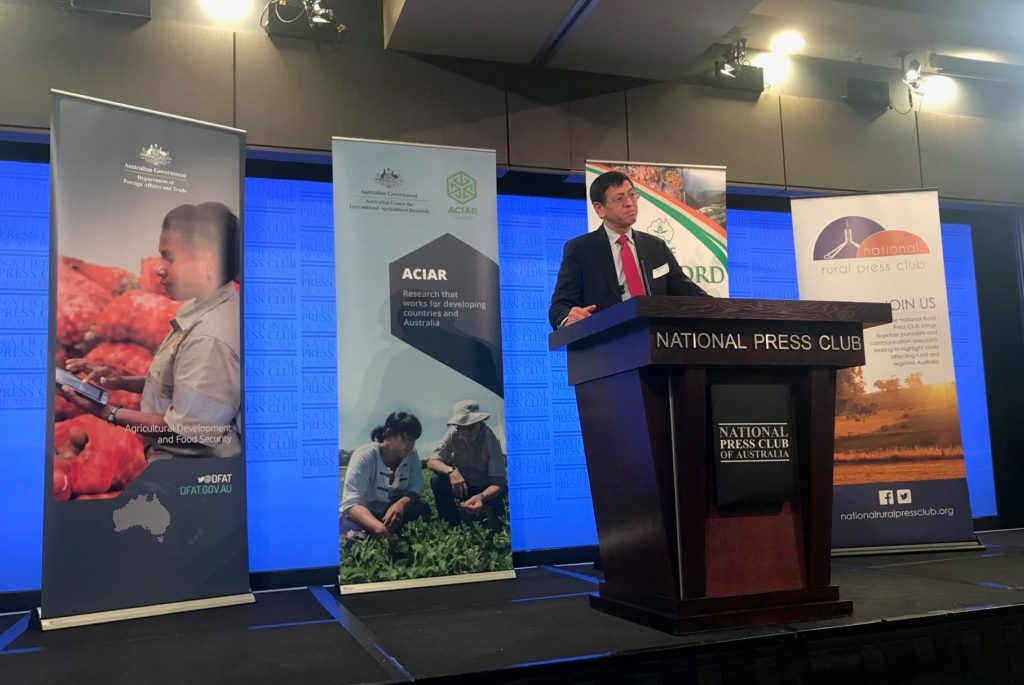
Opinion: Healthy diets and sustainable food systems
April 26, 2019
The Fund was pleased to assist with this month’s visit to Australia by renowned international development economist, Dr Shenggen Fan, Director General of the International Food Policy Research Institute. The Fund organised a National Rural Press Club event, co-hosted with us by DFAT and ACIAR, at the National Press Club – full details are here. Such was the response to the event, that we had a waiting list, with 135 registered to attend. The Fund also managed a media outreach around the address as well as Dr Fan’s involvement at the annual conference of the Australasian Agricultural and Resource Economics Society in the days after the Canberra visit.
As part of the media outreach, Dr Fan had the following opinion piece in Australian weekly rural papers, helping to raise awareness of the ‘urgent need for a drastic shift in diets’.
Healthy diets and sustainable food systems for all
By Dr Shenggen Fan
Shenggen Fan is Director General of the renowned international food policy think-tank, the International Food Policy Research Institute and a member of the EAT-Lancet Commission on Food, Planet, Health. He will be in Australia from 11-15 February for an address at the National Press Club (11 Feb) in Canberra and to the 63rd Annual Conference of the Australasian Agricultural and Resource Economics Society in Melbourne (12-15 Feb).
The global food system faces major challenges and trends related to rapid urbanisation, changing diets, climate change, political uncertainties, and anti-globalisation sentiments. At the same time, there has been growing recognition that, in addition to addressing multiple burdens of malnutrition, there is an increasing need to seek an environmentally sustainable food system in light of climate change. The new EAT-Lancet report on healthy diets from sustainable food systems, which I had the pleasure of contributing to as a Commission member, provides strategies for countries and stakeholders to navigate food systems at a critical crossroads.
Food systems play a key role in nurturing human health and supporting environmental sustainability, yet currently, they are threatening both. Thus, global efforts are urgently needed to collectively transform diets and food production. In this regard, the report draws from the latest evidence from around the globe to present scientific targets as well as overall strategies for food systems.
As the report highlights, transforming to healthy diets by 2050 will require drastic changes. Global consumption of healthy foods, such as fruits and vegetables, will need to double, while over-consumption of foods like added sugars and red meat will need to be more than halved, primarily to address excessive consumption in wealthier countries like Australia.
At the same time, it will be equally important to take a differentiated approach for healthy and sustainable diets in developing countries and for poor populations. For many developing countries and the poor, under-nutrition and access to healthy foods remain as persistent challenges, as noted in the report. Small amounts of animal-sourced foods like dairy, eggs, fish or chicken for young children and women during pregnancy and lactation is crucial for nutrition and health, especially in poor populations. For instance, research finds a strong association between reduction in stunting of children and consumption of animal sourced foods.
Furthermore, the accessibility and affordability of healthy and nutritious foods—both animal-sourced and plant-based—will be key. Many nutrient-dense foods, such as fruits, vegetables, and animal foods, are highly perishable, often making prices significantly higher than that of ultra-processed, nutrient-poor, and calorie-dense staple foods. This makes cost a barrier to the consumption of healthy diets among the poor in many countries, including wealthy ones such as Australia. Promoting enhanced production and productivity of healthy and nutritious foods, while also improving markets in low-income countries will be important to lower prices and increase accessibility of healthy and sustainable diets.
Healthy and sustainable diets may look different from country to country, and we will need more evidence on what drives and challenges the diets of various populations. For the transformation of food systems to ensure human and planetary health for all, it will be crucial for stakeholders to continue to work together in sharing experiences and expanding the knowledge base.






 0
0